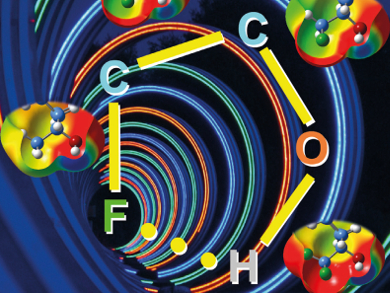In fluorinated organic compounds, the fluorine group affects the chemical properties of neighboring functionalities. The C–F bond, due to the high fluorine electronegativity, causes special reactivity, especially in biological chemistry. Fluorination of conformationally rigid cyclohexanols was recently reported. The H-bond donating capacity is reduced by OH···F intramolecular interactions, rather than increased by the fluorine electronegativity.
Jerome Graton, Jean‐Yves Le Questel, Université de Nantes, France, Bruno Linclau, University of Southampton, UK, and colleagues have extended this work to conformationally restricted aliphatic β-fluorohydrins. The H-bond acidity was studied by IR spectroscopy and quantum chemical calculations using four groups of β-fluorohydrins with increasing levels of conformational flexibility. Compared to the non-fluorinated counterparts, the H-bond acidity of the β-fluorinated alcohols was lower, similar, or higher.
Differences in the H-bond acidity between similar diastereomers are explained by small changes in the ability of the conformers to take part in OH···F intramolecular H-bonding and the corresponding bond strength. The Kenny theoretical term for H-bond acidity was also calculated and found to correctly describe these small changes. Using this term, the researchers propose a correlation equation that can accurately predict the H-bond acidity in both conformationally rigid and flexible β-fluorinated alcohols.
- Influence of Alcohol β-Fluorination on Hydrogen-Bond Acidity of Conformationally Flexible Substrates,
Jerome Graton, Guillaume Compain, Francois Besseau, Elena Bogdan, Joseph M. Watts, Lewis Mtashobya, Zhong Wang, Alex Weymouth-Wilson, Nicolas Galland, Jean-Yves Le Questel, Bruno Linclau,
Chem. Eur. J. 2016.
DOI: 10.1002/chem.201604940




